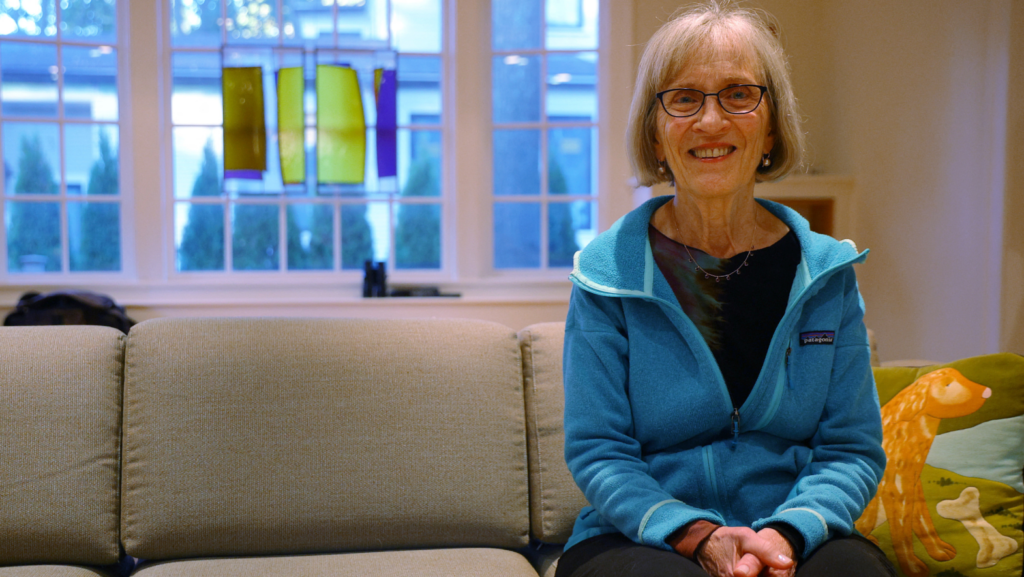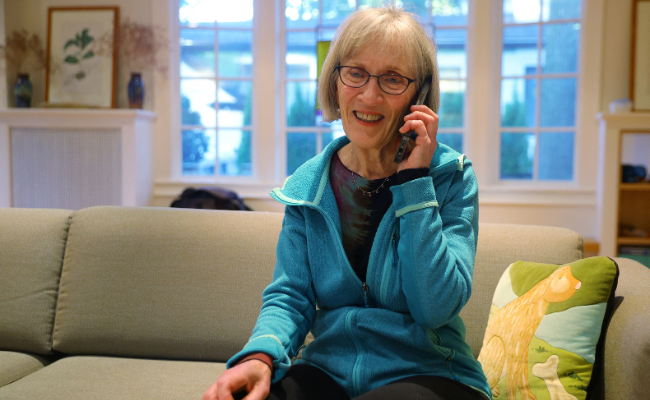Gender gap pioneer Claudia Goldin wins Nobel economics prize

Harvard professor Claudia Goldin poses for a portrait after winning the Nobel Prize for Economics at her home in Cambridge, Massachusetts | Photo by Brian Snyder/Reuters
Harvard economic historian Claudia Goldin won the 2023 Nobel economics prize for her work exposing the causes of deeply rooted wage and labor market inequality between men and women, the Royal Swedish Academy of Sciences said on Monday.
The prestigious award, formally known as the Sveriges Riksbank Prize in Economic Sciences in Memory of Alfred Nobel, is the last of this year’s crop of Nobel prizes and is worth 11 million Swedish crowns, or nearly $1 million.
“This year’s Laureate in the Economic Sciences, Claudia Goldin, provided the first comprehensive account of women’s earnings and labor market participation through the centuries,” the prize-giving body said in a statement. “Her research reveals the causes of change as well as the main sources of the remaining gender gap.”
The award for economics is the final installment of this year’s crop of Nobels that have seen prizes go to COVID-19 vaccine discoveries, atomic snapshots and “quantum dots” as well as to a Norwegian dramatist and an Iranian activist.
Goldin, who in 1990 became the first woman to be tenured at Harvard’s economics department, is only the third woman to win the Nobel economics prize, and the first to win it by herself rather than sharing it.
She hailed the decision as “an award for big ideas and for long-term change.”

Harvard professor Claudia Goldin talks on the phone after winning the Nobel Prize for Economics at her home in Cambridge, Massachusetts, US | Photo by Brian Snyder/Reuters
“There are still large differences between women and men in terms of what they do, how they’re remunerated and so on,” Goldin told Reuters at her home in Cambridge, Massachusetts. “And the question is, why is this the case? And that’s what the work is about.”
Goldin’s 1990 book “Understanding the Gender Gap: An Economic History of American Women” was a hugely influential examination of the roots of wage inequality over 200 years of history.
She has followed up with studies on the impact of the contraceptive pill on women’s career and marriage decisions, women’s surnames after marriage as a social indicator, and the reasons why women are now the majority of undergraduates.
She said at a press conference at Harvard that women had throughout history often been “hidden from view and uncompensated” for doing the same labor that men were paid for.
“There are still large differences between women and men in terms of what they do, how they’re remunerated and so on,” Claudia Goldin told Reuters at her home in Cambridge, Massachusetts. “And the question is, why is this the case? And that’s what the work is about”
“They have over time left that arena of home or family farm or family business and moved to the broader arena of market production,” she said. “They’ve become workers, they’ve begun earning a living for themselves and for their families. Their lives have greatly changed, but the labor market and the policies of governments are often slower to respond.”
Randi Hjalmarsson, a member of the Economic Prize committee, said Goldin’s discoveries “have vast societal implications.”
Hjalmarsson quoted Goldin’s own words: “By finally understanding the problem and calling it by the right name, we will be able to pave a better route forward.”
Goldin’s “dedication to improving economic equality is an inspiration to us all,” European Central Bank president Christine Lagarde said on social media platform X.
“Both lose”
While it is illegal across much of the world for employers to discriminate based on gender, women still face significant shortfalls in pay compared to men.
In the US, women last year earned on average 82 percent of what men earned, according to Pew Research Center. In Europe, women earned 13 percent on average less per hour than men in 2021, according to European Commission data.
Goldin’s work revealed that while there has been progress in narrowing the gap over past decades, there is little evidence of it fully closing any time soon.
She has attributed the gap to factors ranging from outright discrimination to phenomena such as “greedy work,” a term she coined for jobs that pay disproportionately more per hour when someone works longer or has less control over those hours, effectively penalizing women who need to seek flexible labor.
The economics award is not one of the original prizes for science, literature, and peace created in the will of dynamite inventor and businessman Alfred Nobel, but a later addition established and funded by Sweden’s central bank in 1968.
Past winners include a host of influential thinkers such Friedrich August von Hayek, Milton Friedman, and, more recently, US economist Paul Krugman.
Last year, a trio of US economists including former Federal Reserve chair Ben Bernanke won for their research on how regulating banks and propping up failing lenders with public cash can stave off an even deeper economic crisis, like the Great Depression of the 1930s.
Only two women have previously landed the economics prize: Elinor Ostrom in 2009 and Esther Duflo a decade later.
In a recording posted on the Nobel website, Goldin said the first thing she did on hearing she had won was to tell her husband, who asked her what he could do.
“I told him to take the dog out and make some tea and that I had to prepare for a press conference,” Goldin said.
($1 = 11.0095 Swedish crowns)
(Reporting by Simon Johnson, Mark John, Niklas Pollard and Johan Ahlander; Additional reporting by Terje Solsvik and Brian Snyder in Cambridge, Massachusetts and Jonathan Allen in New York; Editing by Catherine Evans and Sharon Singleton)

